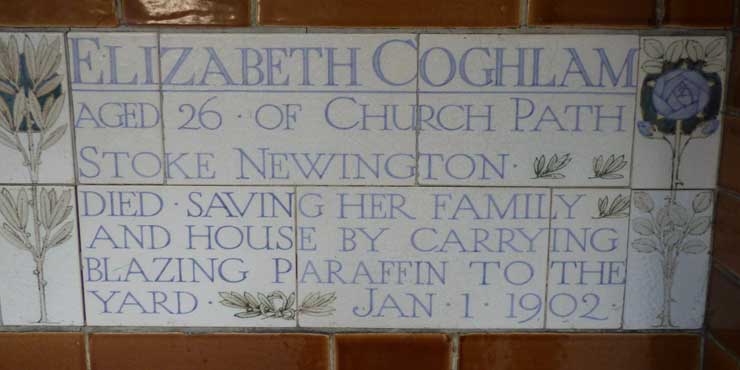
For those of us living in the 21st century the past is, almost, foreign territory - so familiar, yet so strange.
The Memorial to Heroic Self Sacrifice really does demonstrate this.
Some of the causes of death recorded here are, tragically, all too familiar to us - and we still read about similar tragedies in the newspapers today.
Other causes of death have been rendered almost obsolete, by modern advances in our way of life, or by the higher importance now given to health and safety.
Take Elizabeth Coghlam (1878 - 1902), for example.
Her plaque in Postman's Park carries the following harrowing inscription, "Elizabeth Coghlam, Aged 26, Of Church Path, Stoke Newington. Died Saving Her Family And House, By Carrying Blazing Paraffin To The Yard. Jan 1 1902."
Sadly, such tragedies were commonplace in an age when the widespread use of electricity was still to be universally adapted, and so many households relied on oil and gas lamps to illuminate their houses when darkness fell.
A report on the tragedy that befell the unfortunate Mrs. Coghlam appeared in The Lincolnshire Chronicle on the 3rd of January 1902, under the above headline:-
"A paraffin lamp was the cause of an outbreak of fire early on Wednesday morning at Church Path, Albany-road, Stoke Newington, by which Mrs.. Elizabeth Coghlam, aged 26, lost her life through a desire to save the lives of her two children.
Mrs Coghlam, while placing a lighted paraffin lamp on the mantelpiece in a room on the ground floor of her residence, knocked the lamp against the wall, breaking the glass container.
The escaping oil immediately ignited, and pouring down the woman's clothes, she was quickly enveloped in flames.
Rushing out into the yard, she was seen by neighbours, who speedily extinguished the fire.
On the arrival of the brigade, Mrs. Coghlam, though terribly burnt all over the body, was still conscious, and explained bow the accident happened.
She said she rushed into the yard so as not to set the house on fire, as her two children were sleeping in the room above.
An ambulance was provided, and the injured woman was conveyed to the German Hospital, Dalston-lane, where the died later in the day."
Despite what is stated on her memorial plaque about Elizabeth dying saving her family and house, the children whose lives Elizabeth Coghlam's brave act almost certainly saved, were not her children but were, in fact, the children of the Brien family, for whom Elizabeth was working as a live in domestic servant.
The misunderstanding was due to newspaper' that reported on the tragedy under headlines such as, "A Woman Dies For Her Children" (Portsmouth Evening News and "A Mother's Devotion" (Nottingham Evening Post - from which the information for inclusion on the plaque was derviced.
At the inquest into her death, which was held on 2nd January 1902, the jury returned a verdict of "Accidental Death."